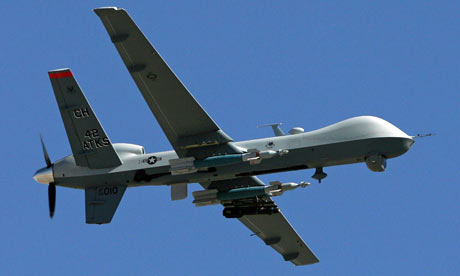
CIA exposed by frontline role along Afghanistan and Pakistan border
Ed Pilkington - The Guardian - UK
Jan. 1, 2010
The suicide bombing of a CIA base in a remote mountain region of Afghanistan this week highlights the agency's increasingly militaristic role in the region.
The base was a key part of the secret US mission to kill militant leaders across the border with Pakistan using unmanned drone aircraft. Seven CIA operatives were killed in the bombing and several more seriously injured.

A Reaper drone, as used by the CIA and American military in Pakistan and Afghanistan. Photograph: Ethan Miller/Getty Images
The blast on Wednesday in Khost province is the second most deadly in the CIA's history, eclipsed only by the 1983 bombing of the US embassy in Beirut in which eight employees died.
Among the dead was the head of the CIA team, a woman described as a veteran of the agency's secret intelligence operations. The team was based at Forward Operating Base Chapman, a camp once used by the Afghan army but now a central planning point for the US drone war.
Remote-controlled aircraft are a crucial element of the fight against al-Qaida and the Taliban hiding along the Afghanistan and Pakistan border.
Although Barack Obama has scaled back on some of the more controversial aspects of the CIA's engagement in counter-terrorism, including its involvement in interrogations, he has quietly increased airstrikes by drones which are thought to have killed more than 300 people in the past year.
In particular, the Obama administration has approved an expansion of the CIA's drone attacks in Baluchistan, the area of Pakistan where many of the Taliban leadership are thought to be hiding.
The planes frequently steered to their targets with intelligence gathered by CIA operatives based on a network of informants on the ground.
It is one such network that is believed to have been the cause of Wednesday's attack. It is understood that the bomber, wearing explosives on his body, was brought inside the CIA base by operatives who saw him as a potential new informant and who may have lowered their guard.
Informants are regularly briefed on bases before being sent out to the border zone to pinpoint militant targets. It is not known whether the bomber was searched before he entered the base.
According to the New York Times, the CIA team at Base Chapman had been homing in on one radical group, run by Sirajuddin Haqqani who is implicated in the deaths of many American soldiers on both sides of the Afghan-Pakistan border.
Obama wrote a message to the CIA in honour of those who had died. He said: "You have served in the shadows, and your sacrifices have sometimes been unknown to your fellow citizens, your friends, and even your families."
The Taliban claimed responsibility for the suicide bombing, telling Reuters: "This deadly attack was carried out by a valorous Afghan army member."
The suggestion that the bomber may have been a member of the Afghan forces was denied, but it is likely to heighten anxieties. American and Afghan military personnel often intermingle.
Former US officials said that the man had been invited on to the base and had not been searched.
One of the officials, a former senior intelligence employee, said the man was being courted as an informant and that it was the first time he had been brought into the camp.
www.guardian.co.uk/world/2010/jan/01/cia-afghanistan-suicide-bomber-taliban
